The Flock | Interview | Frank Posa
Chicago’s jazz-rock band The Flock released two albums on Columbia Records. Among their most notable albums are ‘The Flock’ and ‘Dinosaur Swamps’.
The Flock released three early singles on Chicago-based labels USA Records and Destination Records between 1966 and 1968. At first, the group was mainly focused on garage rock. Frank Posa (trumpet), Rick Canoff (saxophone), Tom (T.S. Henry) Webb (saxophone), Jerry Goodman (violin), Jerry Smith (bass), and Ron Karpman (drums) were the members when their debut album was recorded. Their debut album was greatly shaped by the influence of Miles Davis’ ‘Bitches Brew,’ which Tom Webb featured in but was not recorded on tape. On July 9, 1969, John McClure (known for his work with classical and jazz artists) produced ‘The Flock’. The group went back to the studio and recorded a second album named ‘Dinosaur Swamps’. They started working on a third studio album, ‘Flock Rock’, but according to rumors, Clive Davis of Columbia Records had raided The Flock and recruited Jerry Goodman to join the Mahavishnu Orchestra project. In 1975, The Flock reunited for an album named ‘Inside Out’.
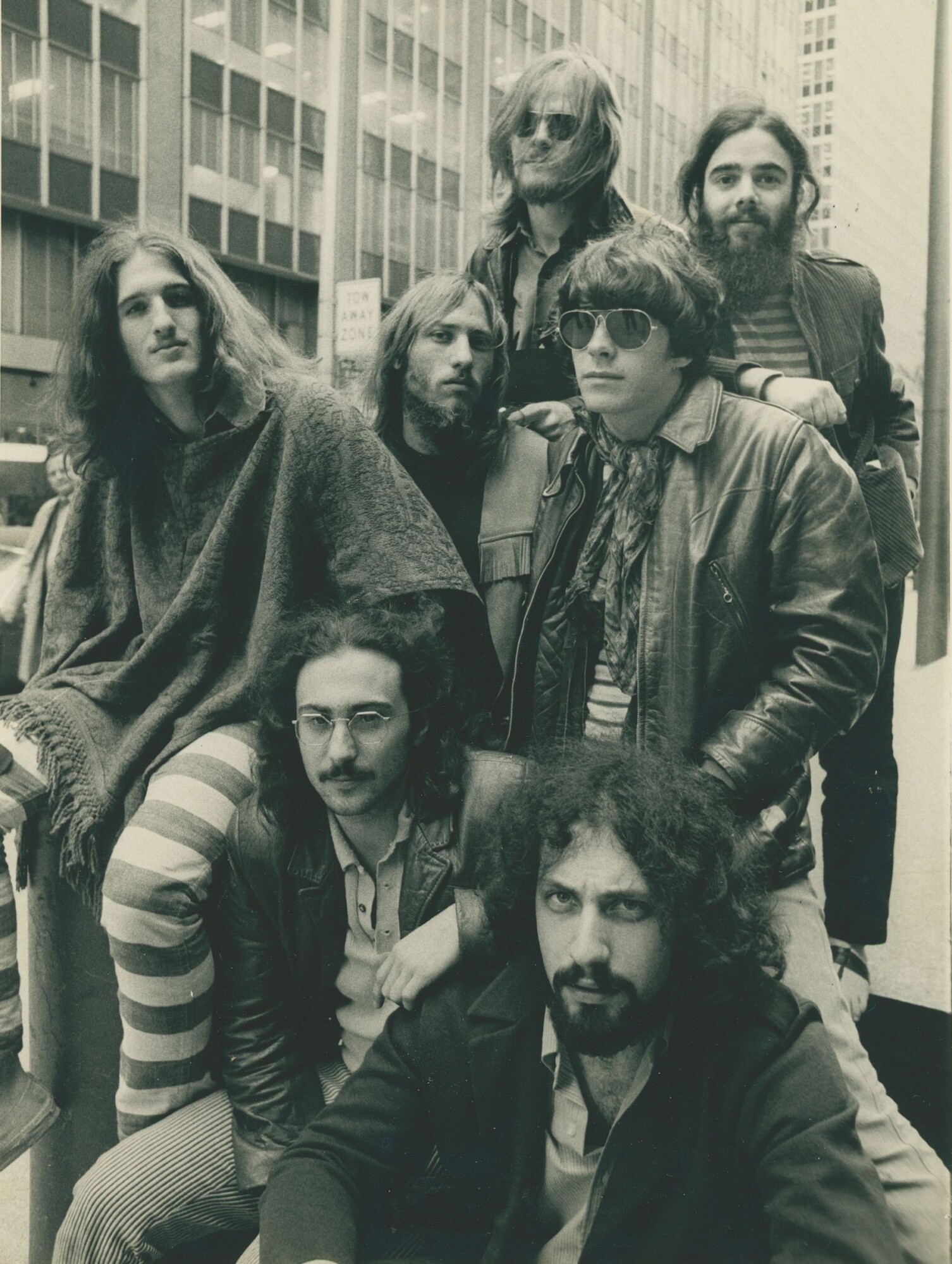
“I liked mostly the kind of music Miles was playing and every year it was different”
Thank you so much for taking your time and effort. How did you first get interested in trumpet?
Frank Posa: My Dad came from Italy to the United States during the second world war. He didn’t want to fight for Mussolini. His sister had already come to America a few years earlier and was married and living in Chicago. My Dad moved in with her until he could find work. He was a “cutter” – this is a tailor who designs men’s clothing. He worked at a very expensive clothing company in Chicago designing suits for people like Liberace and Red Skelton. He met a girl who lived next door. They got married and I was their first child. My Dad always wanted to be a trumpet player, so when I was about 10 or 12, he took me to a music teacher that lived in our neighborhood. The guy was a jazz trumpet player who also taught music on the side. After our meeting, my dad asked me what instrument I wanted to play. I chose drums. My Dad then handed me my first trumpet (which I still own). At first, I resisted practicing, but over time I started to like that I could play music. I interacted with my teacher who gave me some insight into what jazz was about, which I really started to like. I started buying jazz albums, with my dad’s help, and listening more and more to jazz trumpeters. I had several favorites, but the first time I heard Miles Davis, I went a little “crazy” and started screaming – “DO YOU HEAR THAT?” to my parents, who had no idea what I was talking about. I continued playing, mostly jazz, through high school band and college orchestra & band. My Dad had me play ‘Cherry Pink and Apple Blossom White’ at every family get together. I was all in love with the instrument.
You grew up in the Chicago area? Would you like to discuss some of the very early days growing up in your city?
Well, As I mentioned above, I was a little different than all the other kids in our neighborhood. I was the only one who played a musical instrument. Well, almost, there was a kid much younger than me who played great guitar. Anyway, when not practicing my horn, I did the usual stuff growing up. Played “shoot ‘em up” with toy guns and rode our bicycles around the neighborhood. About my third year in high school, one of my high school buddies suggested we start a group. He was a drummer. I said OK, and we started to try and find some people in our school who would want to play something like Rock & Roll and a Jazz mixture. Sort of Jamming in Rock. He named the Band “Frankie and the Shades”. We performed at a few High School dances and a couple of small weddings. Never made more than one dollar each, sometimes less. I tried very hard to get that young guitar player to play with us, but he was way too bashful and usually ran out crying. Man! He was good for such a young person.
Was there a certain moment in your life when you knew that you wanted to become a musician?
Not exactly. I enjoyed playing and kept getting better at it, which I liked. I liked that I could play and understand music. I played along with records I bought or tried to get the same sound as a particular piece of music I heard. I really enjoyed it. My dad loved Dixieland, but I didn’t. I liked mostly the kind of music Miles was playing and every year it was different. One day, my dad was listening to a Dixieland band playing on our record player and I made a negative remark about it. My dad said to me – “you just don’t like it because you can’t play it”. I took that very personal, and said “Oh Yeah,” picked up my horn and proceeded to blow some Dixieland music along with the recording he was listening to. He was impressed. This little incident made me want to get even better. But, at this point in time, I had no idea how to become a professional musician. Or what that even meant.
How did you first get involved with music? What would be some of the very influences for you? Where did you usually find new music in those early days?
Well, I was too young to go to bars, which is where most of the jazz music was played in my neighborhood. Me and some of my closest musical friends from school started to try to peek into the side of the door or through the window at the musicians playing in these bars. After some time, some of the owners or managers of these music venues would let us in if we sat in a corner and were quiet. As I got older, most of these places closed and I had to start searching for musical venues where some of my favorite musicians were playing. I did get to see Dizzy Gillespie (and shake his hand), Wynton Marsalis (several times), Chet Baker, and even Miles Davis close up (although I started to stutter when I tried to talk to him). Of course, I listened to The Beatles, The Rolling Stones, and even The Beach Boys on radio and TV. But I was particular. For instance I hated The Doors and refused to listen to them. I did see them live a couple of times, but only because my friends “dragged” me there. There were more places to see and hear “Rock” than “Jazz” in the Chicago area at that time and the “Jazz” places were closing faster than the “Rock” places were opening. So, I guess, my biggest influence was Miles. I had every Miles record I could find and played them all the time when I was home. Seeing him live was the best for me. And the club he was playing in was very small, so I was sitting very close to the stage.
Were you in any bands before The Flock? Tell us about it? Tell us about The Smith Henry Group.
Well, as I mentioned above, the first band I was in was mine – “Frankie and the Shades”. Again, I didn’t name the band, but I liked the name, so I kept it. The idea was that everyone in the band except me would wear sunglasses (shades) on stage. We played a combination of Jazz and Rock, but not really combining the two, except when I soloed. We played for next to nothing, money wise, but most of the guys just loved that we were a band. I met a lot of other musicians during this time. Friends in high school who knew other musicians that didn’t go to my high school. Tom Webb was also in my high school and in the school band, which is where we met. One day while walking home from school Tom mentioned that he was starting a band and asked if I’d be interested in joining his band. I said yes. I started going to Tom’s house to jam with him and talk some more about his band ideas. Over a couple of weeks, he brought in several musicians. Some stayed, some did not. In the end we had a band which Tom named “The Smith Henry Group” because that was his middle name. Tom picked the songs, nothing original. I was in charge of learning the lyrics and writing them down so Tom could memorize the words. The bass player (Tom Blecka) and I soon became very close and stayed close friends until his death. We practiced every day. Then one day, Tom announced he found some work. We were to play a small bar in Wisconsin that was hosting a New Year’s Eve party and wanted a live band. Tom Webb and I had a small argument during this job – Tom did not want to mike me because he thought Trumpet was too loud to mike. This caused quite a problem, since I had to overplay in order to be heard at all and I blew my lip. This is a very bad thing for trumpeters. My lip was bleeding for weeks, and I had to stop playing for at least a month for it to heal properly. I was angry at Tom for this and quit the band.
I would love it if you could share about For Days and a Night. Who were other members of the band and what venues did you play? How much original material did you have?
When I was with “The Smith Henry Group” with Tom Webb, I had to join the musicians’ union so we could be paid for playing. For some reason “4 Days & A Night” decided to expand the band and add horn players. They were specifically looking for a trumpet player and a sax player. I believe this was to be more competitive with “The Flock”. Not knowing where to start looking, Nick Vitullo, their manager, called the musicians’ union and asked for a list of trumpet players. The union told him they don’t do that and hung up. Nick called again and again and again until finally, in anger, they gave him the last trumpet player to become a member – me – then told him he better never call again. So, Nick called me and asked if I’d be interested in joining the group. I don’t think I knew anything about this band, but I thought it certainly couldn’t hurt to try out. So, I went to Nick’s house, where the band rehearsed, and introduced myself and met the band members. I don’t remember what we played, but it was one of the songs in their repertoire. I played along and filled in the spots I thought I should. They liked me and wanted to hire me, but they also needed a sax player, so I would have to wait until they got the sax player. I told them I have a friend who is a very good sax player and, if he is still talking to me, I could possibly introduce you to him. Nick asked if we could do it now. I said OK. So, we drove together to my friend Tom Webb’s house. He always left his doors open in the back of the house (where he slept) and the basement (where he played). I felt a little weird going in unannounced – what if I bumped into his parents or grandparents who both lived there. But I did it anyway. I introduced Tom to Nick and Nick made his pitch. Tom responded he had some other things going on, so he would have to check with where they were before giving his answer. He said he would call in a couple of days. I drove Nick back home and waited for his call. I received the call from Nick within the week and Tom had agreed to also join the band. So, now we had to rename the band since the “4 days” were now 6. So, we renamed the band to “For Days and a Night” – same sounding name, different spelling. The guys in the band when I joined were:
Dennis Giovannini (Guitar)
Bob Diamond (Guitar)
Bob Calvaresi (Bass)
Larbi Ruslan (Drums)
Al Lathan (lead singer)
The band was a cover band and did not play any original material. They played in all the clubs in Illinois that were operating in the 60s and 70s and were very popular.
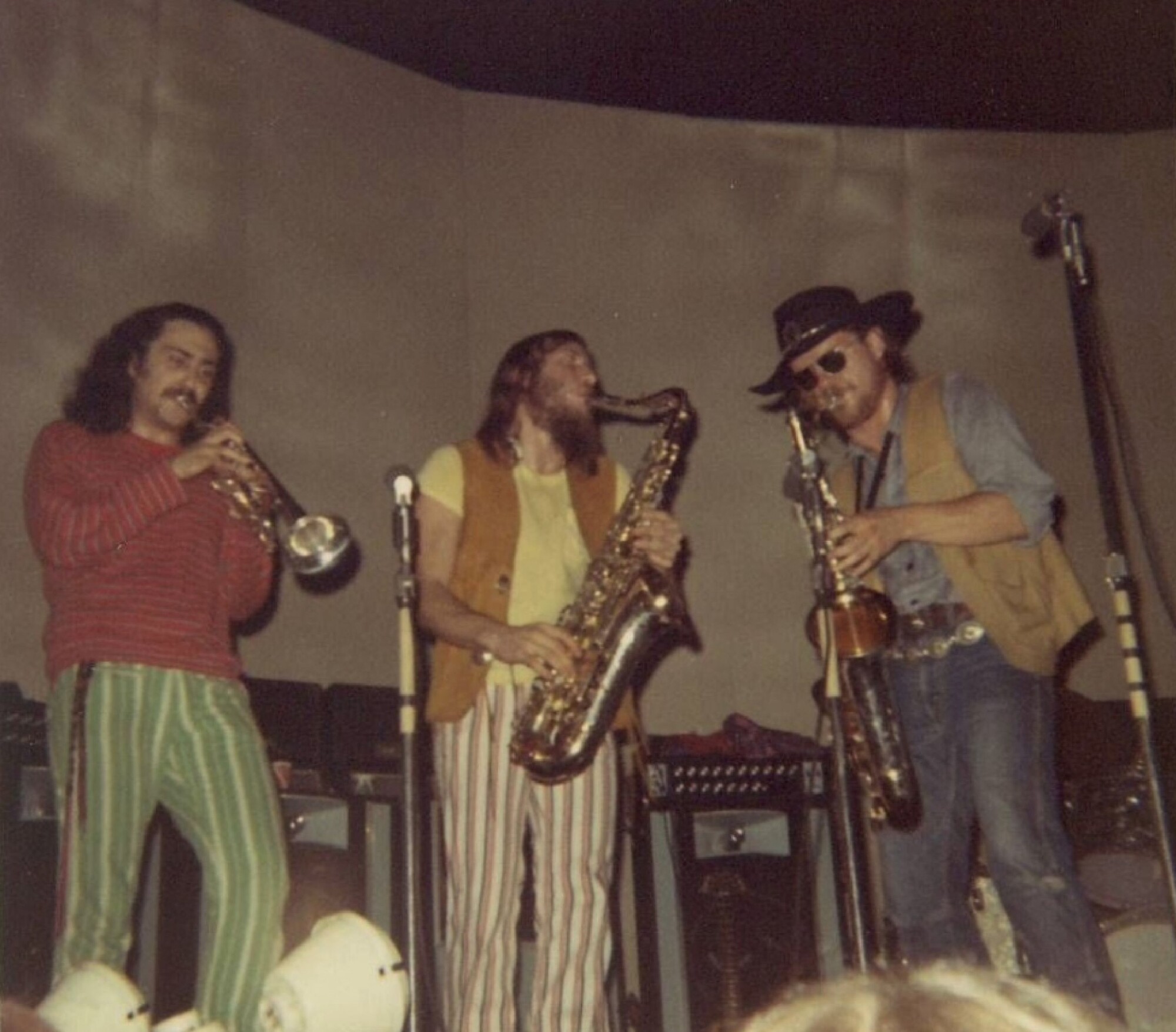
Are there any released or unreleased recordings available of those bands?
Not that I’m aware of.
Can you elaborate on the formation of The Flock and what was the overall vision of the band? When did you officially get together?
I was not in the original Flock. I believe they started around 1963. The original Flock consisted of:
Rick Canoff (Sax & Vocals)
Fred Glickstein (Guitar, Piano, Trumpet, & Vocals)
Jerry Smith (Bass & Vocals)
Rick Mann (Guitar & Vocals)
Ron Karpman (Drums)
The story I heard from Fred Glickstein is:
“Before we were the Flock, we were the Exclusives, but we didn’t really like that name and were looking for a new one. One evening there was a “Battle of the Bands” at the Aragon Ballroom in Chicago. The two bands that were “battling” that night were Chicago’s own New ColonySix and a group from England called The Robin Hoods. After The Robin Hoods finished their set, Fred walked up to one of the members and told him that he really enjoyed his group. Then he asked him where they got the name Robin Hoods. He said that they had chosen between two names, The Robin Hoods or The Flock. Fred then asked if there was another group using the name Flock and he said, “Not that I know of.” So the name had to be imported from England and The Flock was born in Chicago, U.S.A.! That’s how we got the name Flock.”
The original Flock started out as a cover band and played in all the clubs in Illinois. They had three singles that were originals, but not written by the Flock. The Flock charted in Chicago with three of their early Destination singles … ‘Can’t You See (That I Really Love Her)’ reached #22 on the WLS Chart in early 1967, ‘Are You The Kind’ went to #23 on WLS a couple of months later and ‘Take Me Back’ soared all the way to #12 that summer.
I was still playing with For Days and a Night in 1967 and on some days, I went to school. I was enrolled at Wright Junior College, majoring in math, mainly to avoid the draft. I would get information from the other students about when the tests would be given, study at home using the books specified for each class and appear for the test. I aced all my tests, so everything was going well until the school changed their rules and I could only pass if I attended every day, not just the days the tests were given. One of my teachers actually broke down in tears when she was forced to flunk me because of this new rule – even though I had aced her last test. So, for a while, I had to attend class as often as I could. This started causing problems with our rehearsals. Eventually, I had to quit school and work on avoiding the draft another way.
Between sets at one of our performances, I noticed Rick Canoff backstage talking with Tom Webb. I tried to get into the conversation, but they stopped talking every time I got close.
A few days later, I got a call from Tom Webb asking if I would meet him and Rick Canoff for lunch. I said I could, but it would have to be near my school. At this lunch meeting, Rick Canoff told me that he and Tom had been talking about Tom joining The Flock for some time. He also told me how much he liked the way Tom and I interacted on stage. He told me that Tom was going to join The Flock and wanted to know if I would be interested as well. I told him I had to have a day or two to think about it.
Of course, I decided to join The Flock. I really loved the guys in For Days and a Night and did not want to suddenly leave them without two horn players. I started asking several of the sax and trumpet players that were in the Wright Junior College Orchestra with me. Fred Entesari, a great sax player, was interested, but I had quite a problem finding a trumpet player who wanted to join a rock band. I finally settled for John Priola, who had more of a Dixiland sound to me. I gave this contact information to For Days and a Night and they were able to keep playing by replacing me and Tom with these two guys.
So, then Tom and I had to learn their repertoire, and also make some changes to their sound as now they had two saxes and a trumpet. Now the band consisted of the following musicians:
Rick Canoff (Sax & Vocals)
Fred Glickstein (Guitar & Vocals)
Jerry Smith (Bass & Vocals)
Rick Mann (Guitar & Vocals)
Ron Karpman (Drums)
Tom Webb (Sax and occasional background Vocals)
Frank Posa (Trumpet)
We also decided we should try writing our own songs. The first one I remember working on was ‘Clown’. Fred Glickstein had written some music and was having difficulty finding words that went with the music. Rick Canoff had some words that he had written without music. Fred was able to work Rick’s words and his music together. We all worked together to create the song. Going forward we continued, as a group, to put the words and music together to make new original songs. Tom Webb contributed many as well as Fred.
Some songs were never performed live because after hearing them during rehearsal, we didn’t like the song.
The song ‘Can Love Be Where I Am?’ was one of those songs. We performed it live once at “Like Young” (a club in Chicago). I had a friend in the audience recording it, so I have a copy of that performance. Another was “Whipping Up Clouds”. This one was never performed. Once we heard the recorded rehearsal, we never played it again.
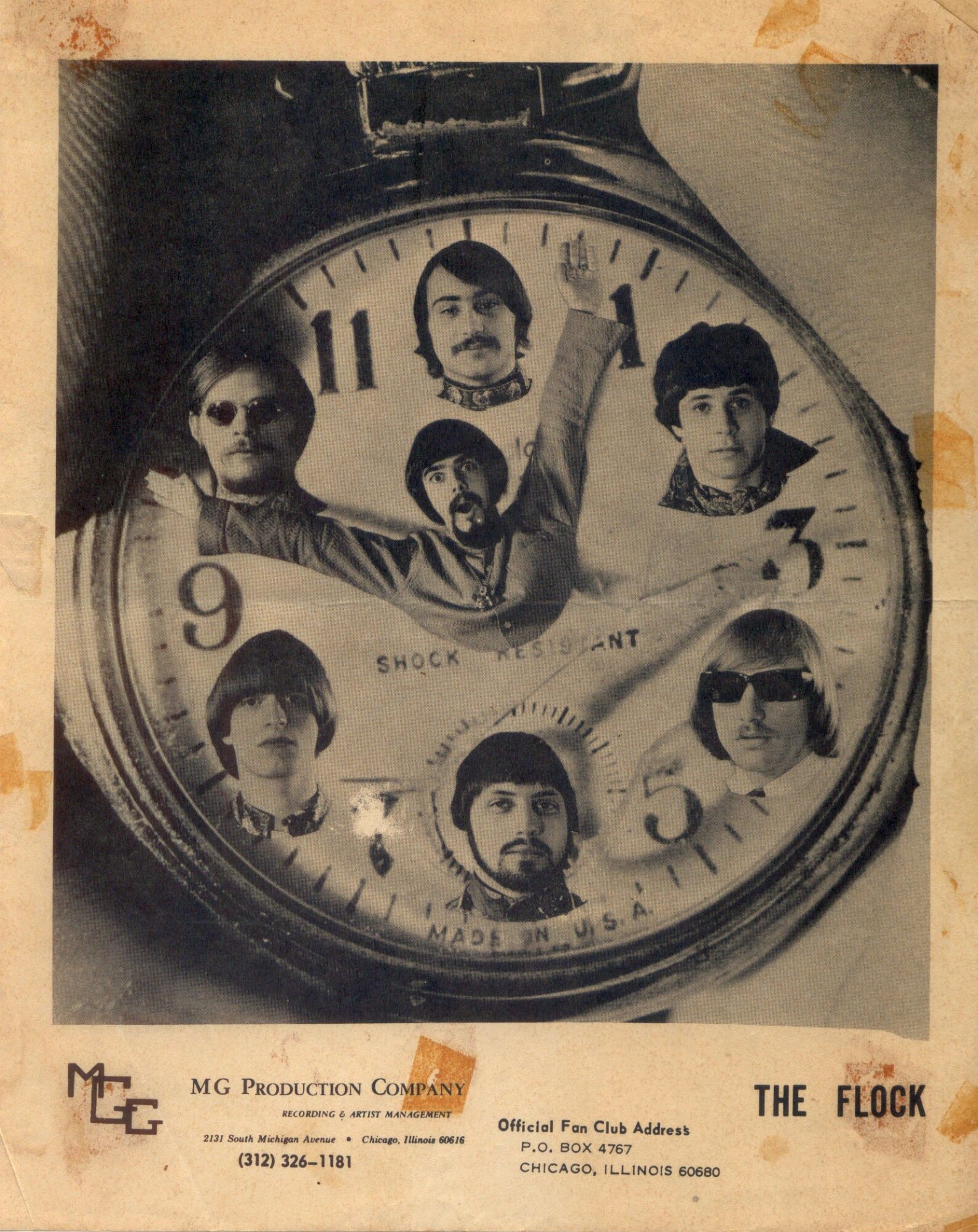
At the time Jerry Goodman was a roadie for the band? How did you get to know him first?
I don’t remember how we met Jerry Goodman. Yes, he was one of our roadies. At first, I was not aware he was a musician. As we became friends, I learned he was a violinist. Both his parents were also violinists for the Chicago Symphony Orchestra. And Jerry’s brother was a pianist.
We started having conversations about possibly adding Jerry Goodman to the band. I remember going to Jerry’s house a few times and jamming with him – softly – his parents didn’t like loud music in the house.
Unbeknownst to me, Rick and Fred had made plans to add Jerry. One day it was announced during a rehearsal that Jerry Goodman was replacing Rick Mann. For me this was good news and bad news. Of all the musicians in The Flock, I had become closest to Rick Mann. I loved having Jerry in the band, but I missed Rick, who I had called my best friend at the time.
In any case, we again had to hit the rehearsals and change the songs to add violin to our sound.
How did you get signed to Columbia and what were the circumstances surrounding your debut release?
Unfortunately, this is an area I don’t know a lot about.
The first thing we did after adding Jerry Goodman, was change management. We talked to Aaron Russo who owned the Kinetic Playground in Chicago, originally named the Electric Theater. This club was one of the biggest rock clubs in the city and hosted all the big-name acts.
Aaron agreed to be our manager and the first thing he did was bring us to New York and get us signed with Columbia Records. We almost immediately started recording.
Your sound was very specific and was further into jazz fusion than either Chicago or Blood Sweat & Tears, influenced by Miles Davis’ ‘Bitches Brew’. Tom Webb was actually playing with Miles Davis on some of the material that wasn’t used ‘Bitches Brew’? What would you say was the main concept behind your debut album and where it was recorded?
Basically, it was what we were doing at the time we signed with Columbia. Nothing new. We did allow more freedom when we were trying things out in the studio than we would do live, but it was basically the same, just a little more free jazz.
We did create and record some songs that were instrumental, but mostly the same as before.
“Our usual encore was a half hour jam where we each got a chance to solo”
How did you approach songwriting within the band?
Again, Fred, Tom, and Rick were the main songwriters. Jerry Goodman did introduce some new ideas as well, specifically ‘Truth’.
Our live shows in Europe especially would turn into more Jazz than Rock at some points. For instance, our usual encore was a half hour jam where we each got a chance to solo.
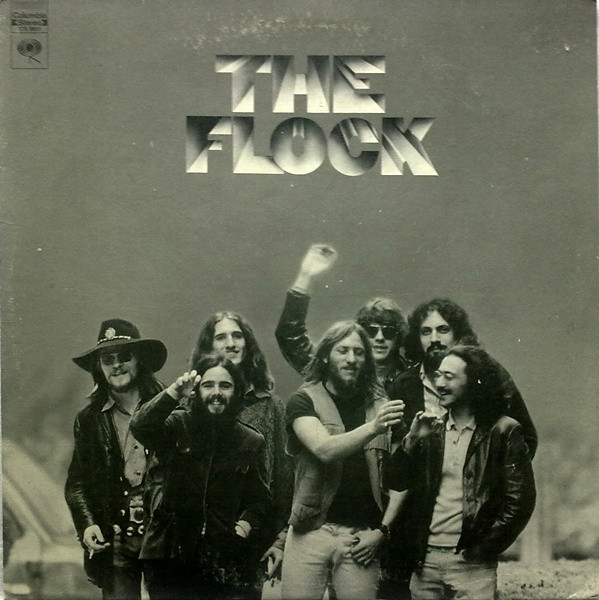
What kind of venues did you play early on and how did that change after the release of your debut album? What are some bands you shared stages with?
We played all the clubs in Chicago including the Kinetic Playground.
After we were signed by Aaron Russo, we started touring. Then we started playing in some of the major clubs around the country.
Some of the bands we shared the stage with:
We opened for Ike & Tina Turner at Fillmore West.
We shared the stage with Ten Years After and Fats Domino at Fillmore East.
We shared the stage with Grateful Dead and Fleetwood Mac at the Warehouse.
We were amongst many at the outdoor concert in Amsterdam including Jefferson Airplane, Pink Floyd, The Byrds, and Santana to name a few. This was captured on the DVD “The Dutch Woodstock”.
Also, at the outdoor concert in San Rafael, California there was Janis Joplin, Steve Miller, Frank Zappa and the Mothers of Invention, Rod Stewart and Small Faces, John Mayall, and many more.
On our first European tour, the first place we performed was the Olympia in Paris. We were the main act. At this concert we received our first standing ovation. Not having any more songs to play, Fred said we should just follow him, and we came out and Fred started playing and we joined him. For some reason this was recorded. This was an improvised jam that lasted 28 minutes. And we got another standing ovation. Going forward, every time we got a standing ovation, we played a jazz jam led by Fred – it became our encore song. Of course, it was always different.
We also played at England’s famous Royal Albert Hall. Some of our concert was recorded for a DVD titled “Fill Your Head with Rock”. We performed with It’s a Beautiful Day and Santana.
And, of course, we performed at England’s famous outdoor concert, The Bath Festival, in which Led Zeppelin’s manager (Peter Grant) forced us off the stage while performing so that Led Zeppelin could perform while the sun was setting. The strange thing about this heinous act was that I didn’t know what was happening. As my microphone was being taken off the stage, I continued to play – following the microphone, until I nearly fell down the stage left stairs.
Many of our recordings and live shows are also available on YouTube.
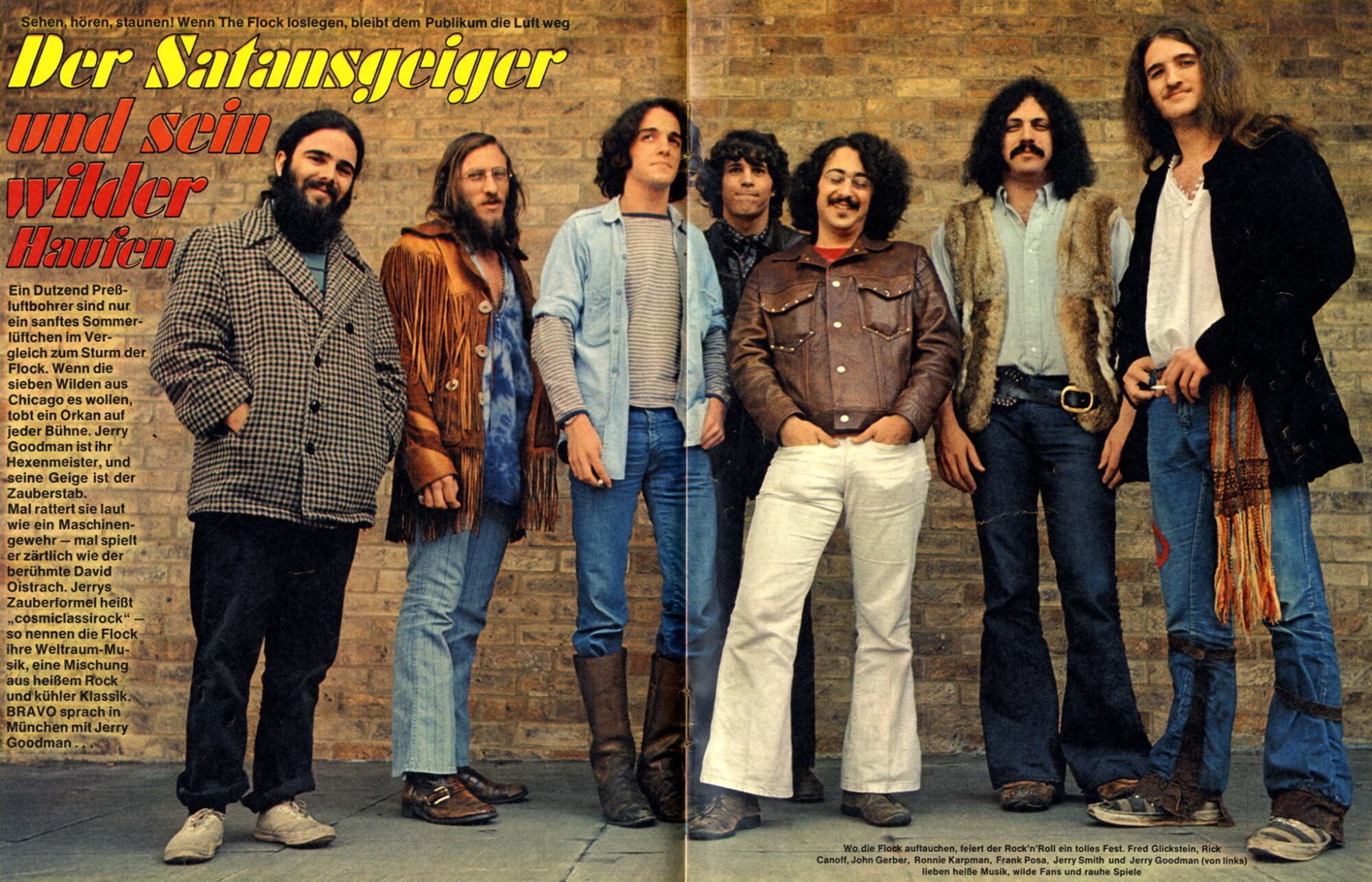
What led to the decision that Jon Gerber replaced Tom Webb?
Tom has a medical issue that affects his breathing. The touring brought him to places that were very uncomfortable for him and he felt that this would cause medical issues. Even before he joined the Flock, Tom was planning to leave Chicago and move to Arizona where the air was better for him. So, after our first tour ended, Tom informed the group that he was leaving.
Rick Canoff and I then started looking for a replacement. Rick liked Jon Gerber. I was a little less impressed by him, but he did play well with us.
Would love to hear how you approach your second album, ‘Dinosaur Swamps’? Was there a concept behind it? Who did the cover artwork?
I’m not sure about the cover artwork, I believe this was taken on by Columbia. We were photographed in the studio in several different poses with the idea that we would be placed into a scene with Dinosaurs. This was mostly Fred’s idea. I believe Fred and Tom came up with the album name.
There was no special theme to the music, but we did decide to allow more jazz improvisation than previously.
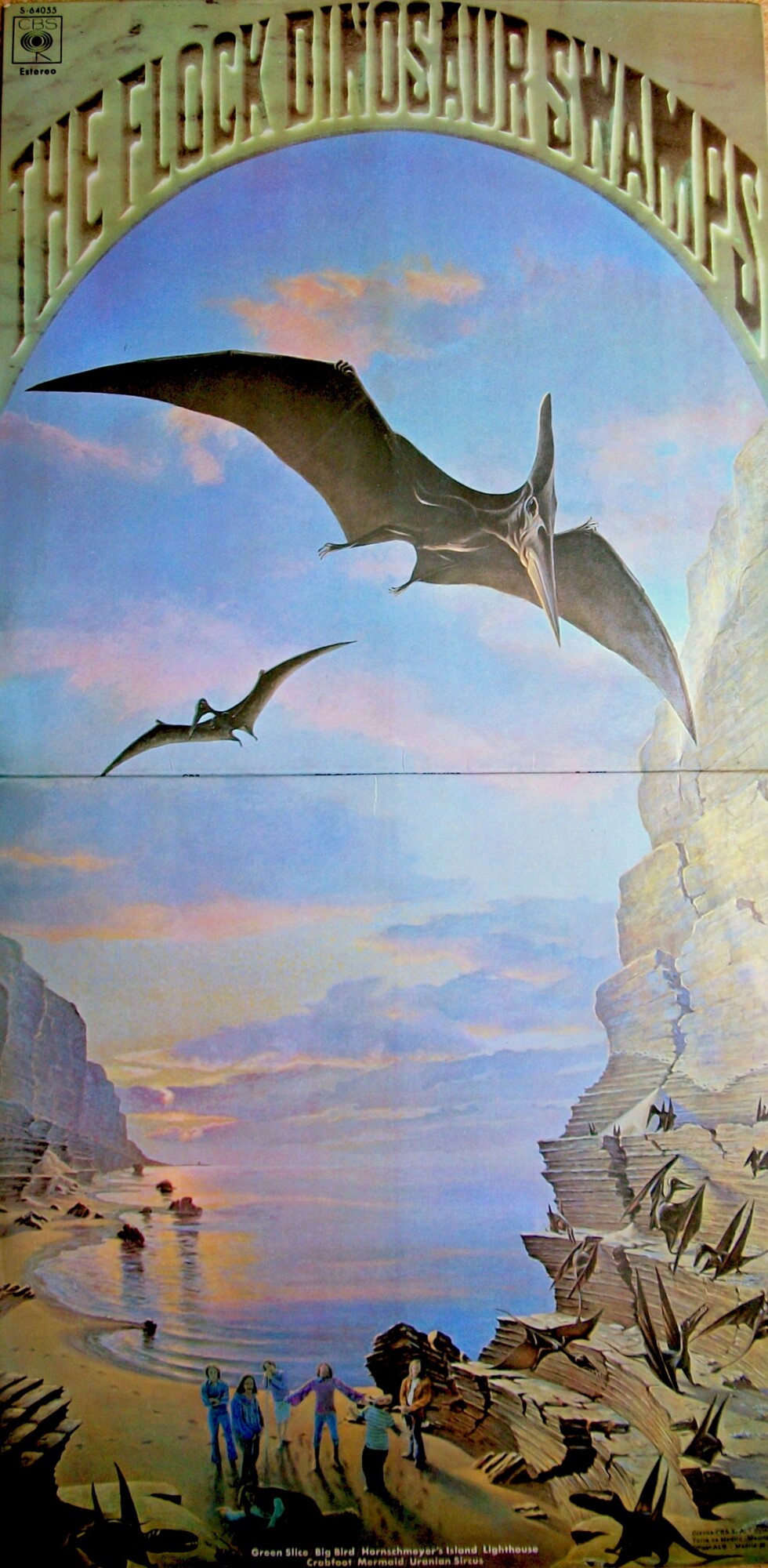
What kind of gear, amps et cetera did you have?
This is an area where I did not participate. I believe this was handled more by Rick Canoff, Fred Glickstein, and possibly Jerry Goodman. Jerry Smith would also have more information about our amps and gear.
Can you discuss the circumstances surrounding your third studio album, provisionally titled ‘Flock Rock’?
The third studio album had a lot more improvisation. It was recorded in Chicago, which I thought was a problem because we were more easily distracted. Where, in New York, we knew nobody there, so we concentrated more on the music. A lot of the album was recorded as a jazz jam and then changed later by adding vocals and breaks in the jam.
When did you decide to disband?
It wasn’t so much a decision by the group than a decision by Rick Canoff. Our rehearsals were getting out of hand. We were inviting friends to join us during rehearsals, which meant we were just jamming and having fun, not working on new songs. Also, since it was a party instead of a rehearsal, drug use was in the picture.
One day, during one of these “rehearsal parties,” Rick announced that The Flock was disbanding, and the name “Flock” should never be used again.
What led The Flock to reunite briefly in 1975 for an album, ‘Inside Out’? Would love to hear a few words about that.
When the Flock got back together in 1975 it was without horns and without violin. This was more closely related to the original Flock. I wasn’t aware of all the musicians in the band, but the original Flock in this Flock was Fred Glickstein, Jerry Smith, and (I think) Ron Karpman. The rest were all new to me and I never met them.
At this time, I was working as a computer software technician during the day and as a jazz musician sometimes at night or weekends. Jazz music did not provide much income. Eventually, I had to stop doing this so I could have some time for my family.
Jerry Goodman was playing with The Dixie Dregs.
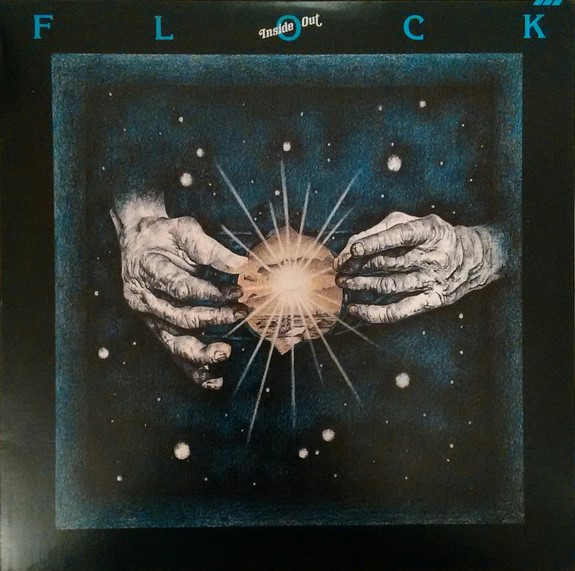
“Our roadie ran upstairs to the stage, grabbed Morrison and threw him down onto the dance floor”
What would be the craziest gig The Flock ever played?
I think the craziest gig had to be the Bath Festival – being thrown off the stage by Led Zeppelin’s manager and crew.
We had a few funny gigs in Chicago where the audience was so out of it, they were mostly unconscious.
Then there was that concert in California (I don’t remember the name of the place). The stage was on the second floor overlooking the dance floor below. During our first set, Jim Morrison walked in with a bunch of women all making a lot of noise. During our break, some people were asking Jim Morrison to perform. So, he went upstairs, grabbed one of our guitars and started to smash it against the other equipment. Our roadie ran upstairs to the stage, grabbed Morrison and threw him down onto the dance floor. He was so “wasted” he didn’t feel a thing – just got up and went back to his seat with the women laughing and joking.
Did you experiment with psychedelics at the time? Would you say they change the perception when it comes to music making/listening?
Yes, I did experiment and no, I don’t think it changed my perception of listening to music. Sometimes, it made it a little harder to play the music as my brain was not completely in control.
Looking back, what was the highlight of your time in the band? Which songs are you most proud of? Where and when was your most memorable gig?
I guess if I would pick the most memorable gig, it would be the Royal Albert Hall performance. The place has so much history. The night we played, someone came into the dressing room before we went on stage and told us that John Lennon and Paul McCartney were in the audience. I could never confirm this, but it did make us a bit nervous at the start. Then we settled down.
As far as our songs, I loved them all. If I was to pick a few favorites, I would say ‘Truth’ was my top favorite. I also liked ‘I Am the Tall Tree’ and ‘Big Bird’.
Is there any unreleased material by The Flock or related projects?
Not to my knowledge. I have several of our encore jams that were never actually released, but these are not usually something that would be released.
What are some of the most important players that influenced your own style and what in particular did they employ in their playing that you liked?
Well, for me it was Miles Davis. He was able to play straight up jazz as well as mix jazz with all other types of music including rock and folk. For me, he not only was the best trumpet player, but he was also the most amazing musician I have ever heard or seen on any instrument.
Are you still playing these days? What currently occupies your life?
I haven’t played in many years. In the late 70s I got into computer hardware and software. It turned out my music and math background made it easy for me to understand computers and how they worked. After a short 4-to-6-month class in computer technology, I got a full-time job and that part of my life just kept growing. It left very little time for playing. I did try to keep it up with small jazz bands I created, but this started to become very difficult for many reasons I’m not comfortable talking about. So, in the mid-80s I stopped playing.
I do plan to start again this year as I’ve now been retired from my computer software work for a full year and have no more business dealings. I have met many musicians that live in my vicinity who are interested in playing with me.
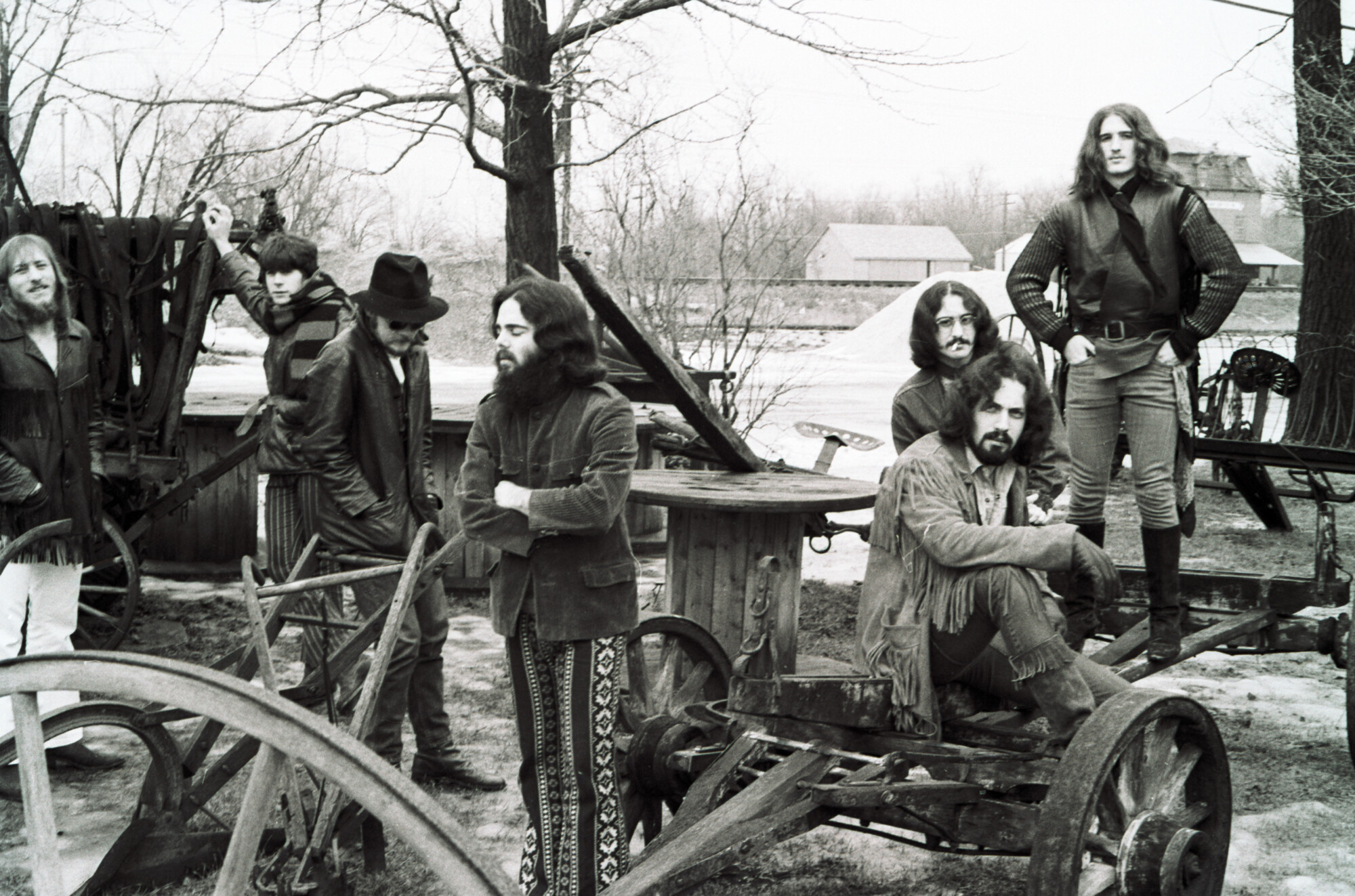
Thank you for taking your time. Last word is yours.
It’s nice to see that Jerry Goodman and Jerry Smith are still playing and making music together.
Klemen Breznikar
Headline photo: The Flock promotional photo (1970)
All photo materials are copyrighted by their respective copyright owners, and are subject to use for INFORMATIONAL PURPOSES ONLY!
The Flock | Interview | Jerry Smith

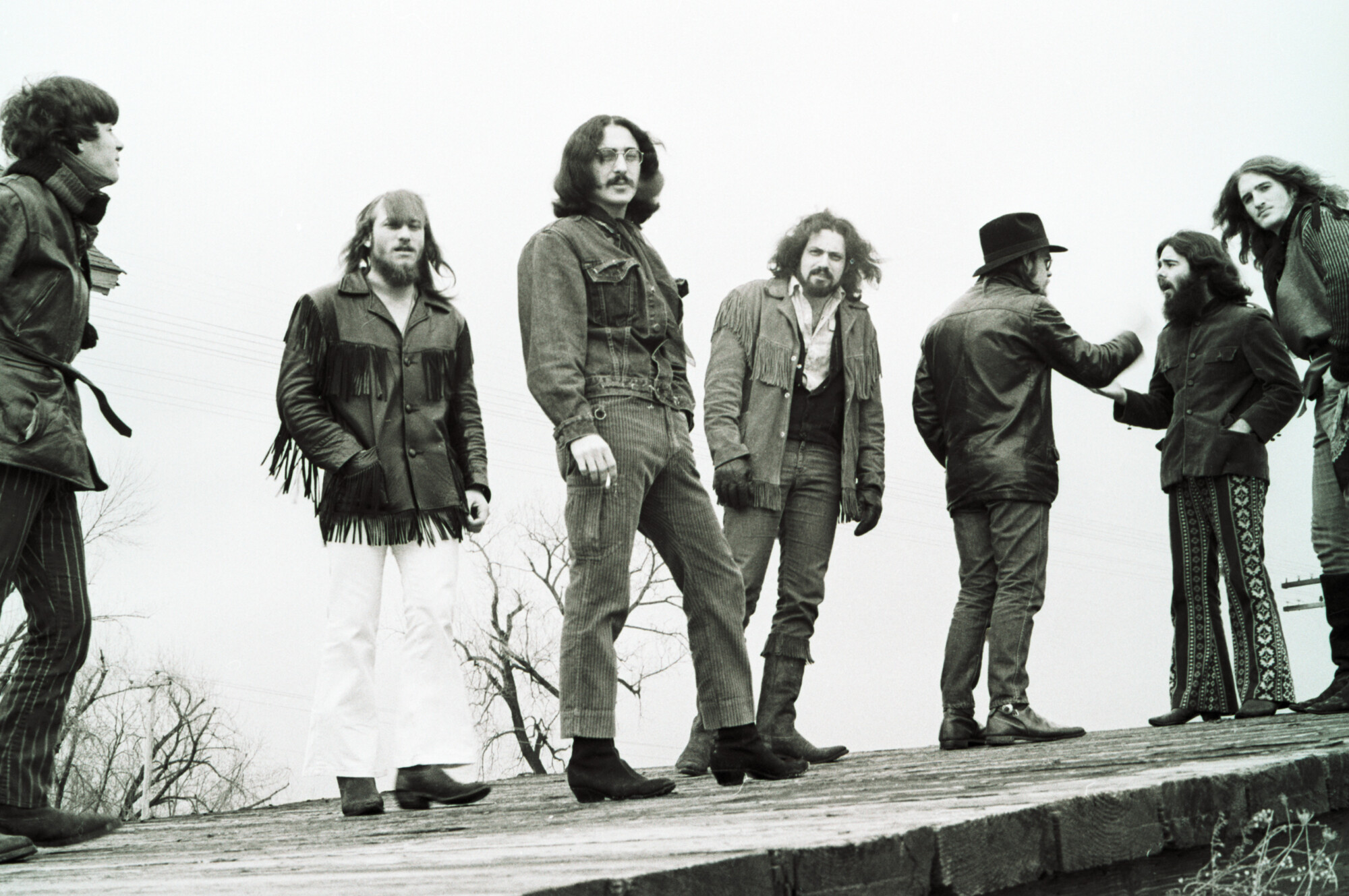
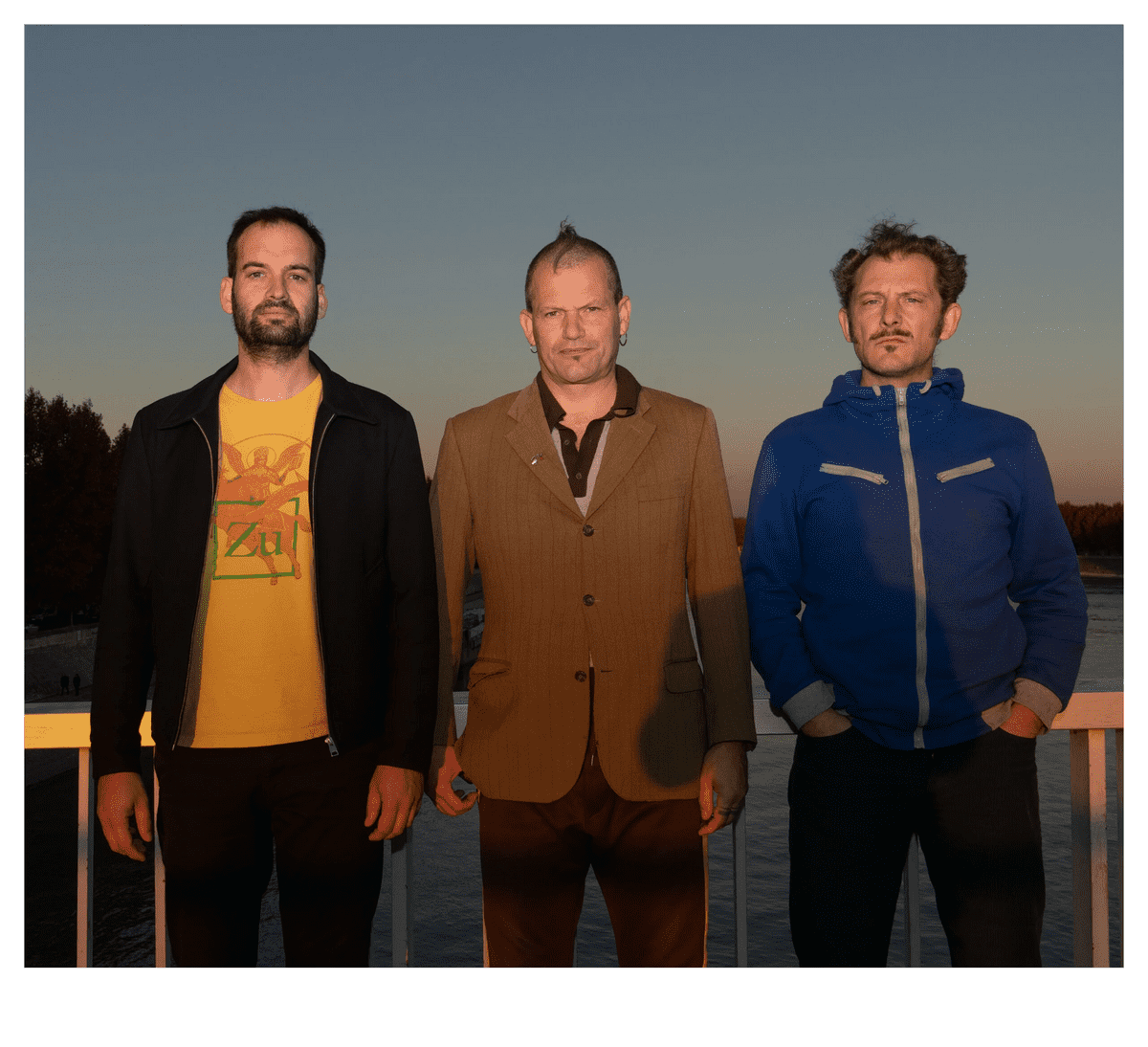
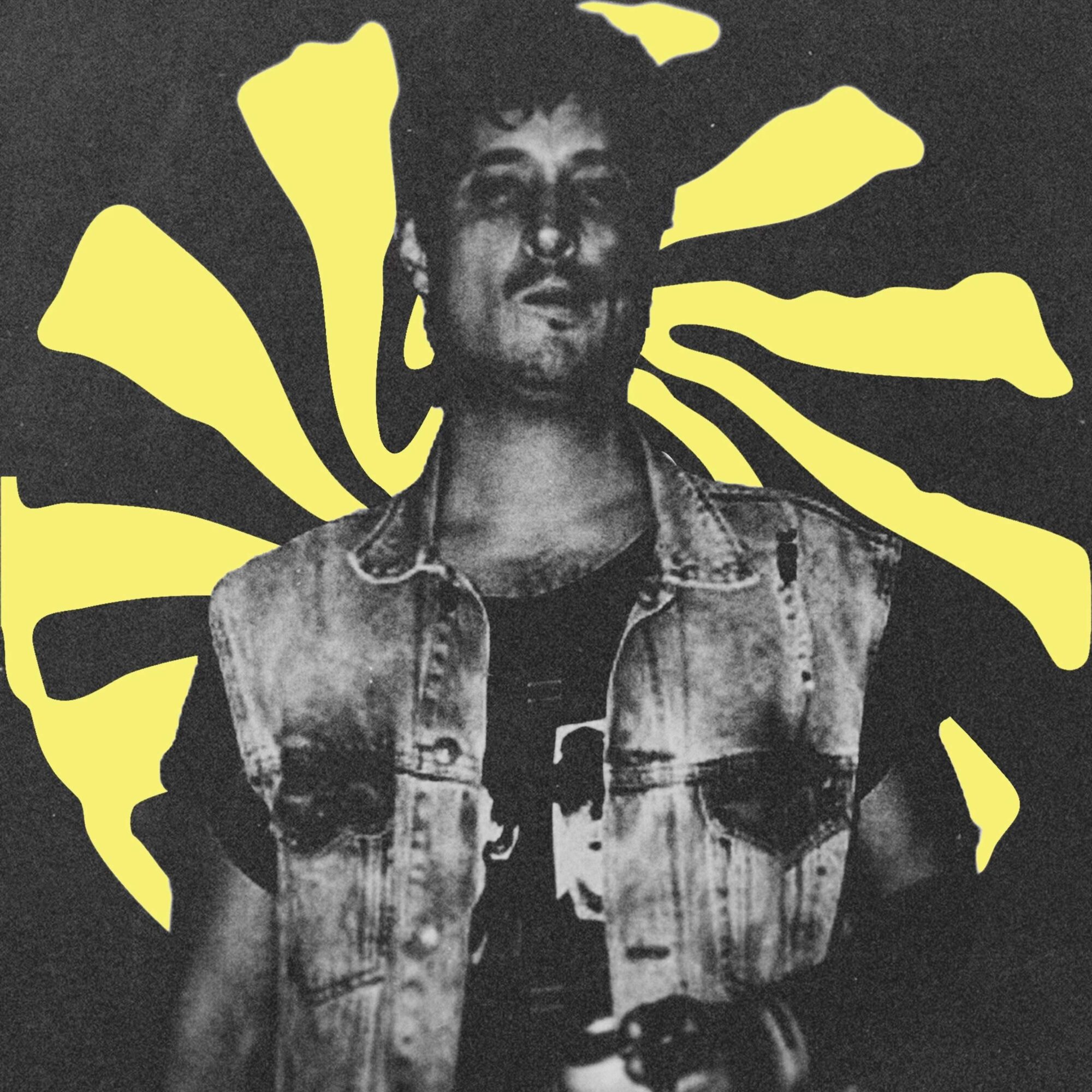
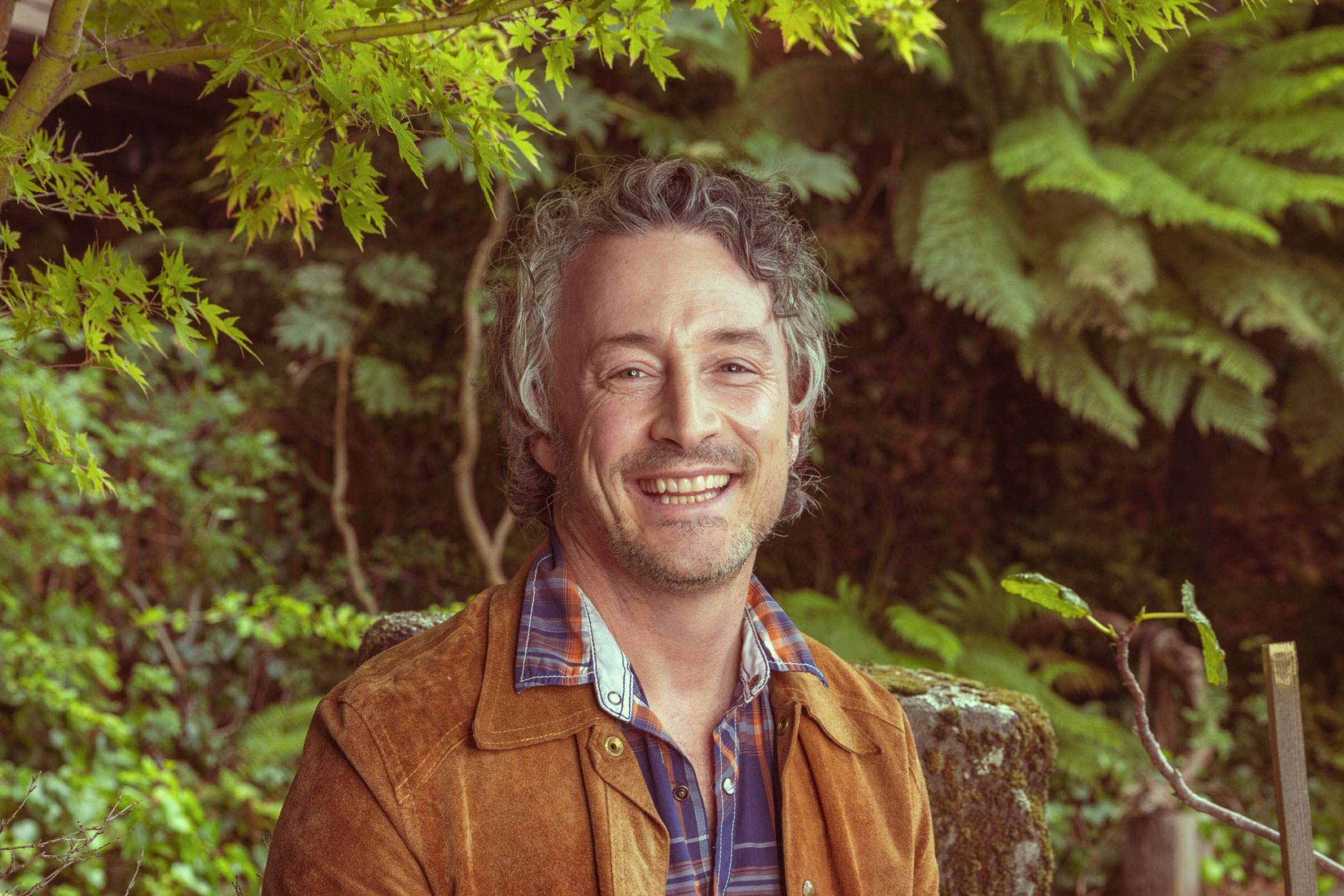
This Band was an example of the talent that came from Chicago. A very rich field of music and talent. Saw the Flock a few times. Great interview and set the record straight on the early Chicago music scene